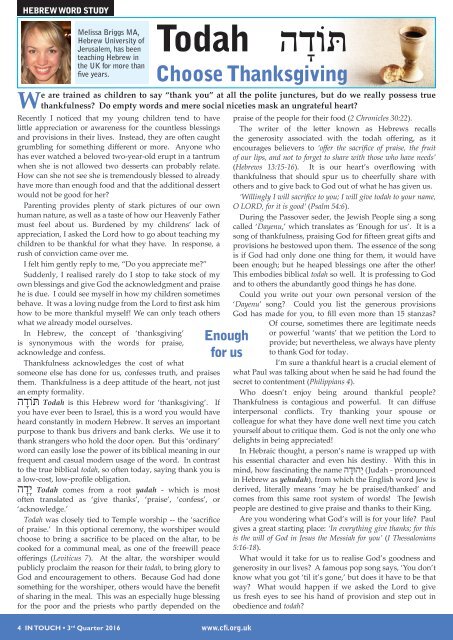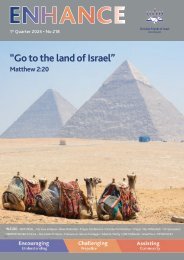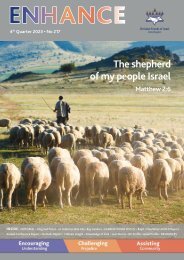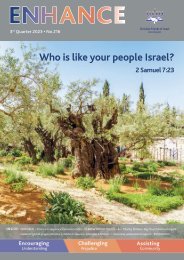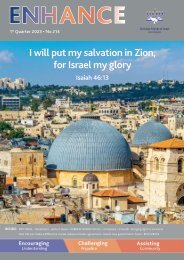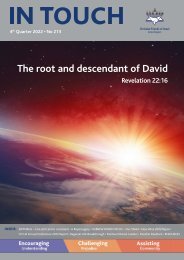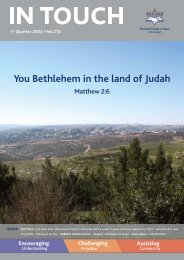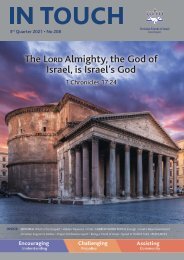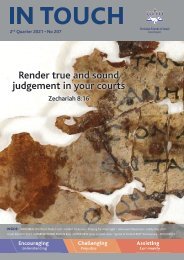In Touch Quarter 3 - 2016
Our latest magazine with news, teaching material, articles about events and resources to buy
Our latest magazine with news, teaching material, articles about events and resources to buy
You also want an ePaper? Increase the reach of your titles
YUMPU automatically turns print PDFs into web optimized ePapers that Google loves.
HEBREW WORD STUDY<br />
Melissa Briggs MA,<br />
Hebrew University of<br />
Jerusalem, has been<br />
teaching Hebrew in<br />
the UK for more than<br />
five years.<br />
Todah<br />
Recently I noticed that my young children tend to have<br />
little appreciation or awareness for the countless blessings<br />
and provisions in their lives. <strong>In</strong>stead, they are often caught<br />
grumbling for something different or more. Anyone who<br />
has ever watched a beloved two-year-old erupt in a tantrum<br />
when she is not allowed two desserts can probably relate.<br />
How can she not see she is tremendously blessed to already<br />
have more than enough food and that the additional dessert<br />
would not be good for her?<br />
Parenting provides plenty of stark pictures of our own<br />
human nature, as well as a taste of how our Heavenly Father<br />
must feel about us. Burdened by my childrens’ lack of<br />
appreciation, I asked the Lord how to go about teaching my<br />
children to be thankful for what they have. <strong>In</strong> response, a<br />
rush of conviction came over me.<br />
I felt him gently reply to me, “Do you appreciate me?”<br />
Suddenly, I realised rarely do I stop to take stock of my<br />
own blessings and give God the acknowledgment and praise<br />
he is due. I could see myself in how my children sometimes<br />
behave. It was a loving nudge from the Lord to first ask him<br />
how to be more thankful myself! We can only teach others<br />
what we already model ourselves.<br />
<strong>In</strong> Hebrew, the concept of ‘thanksgiving’<br />
is synonymous with the words for praise,<br />
acknowledge and confess.<br />
Thankfulness acknowledges the cost of what<br />
someone else has done for us, confesses truth, and praises<br />
them. Thankfulness is a deep attitude of the heart, not just<br />
an empty formality.<br />
Todah is this Hebrew word for ‘thanksgiving’. If ּתֹודָ ה<br />
you have ever been to Israel, this is a word you would have<br />
heard constantly in modern Hebrew. It serves an important<br />
purpose to thank bus drivers and bank clerks. We use it to<br />
thank strangers who hold the door open. But this ‘ordinary’<br />
word can easily lose the power of its biblical meaning in our<br />
frequent and casual modern usage of the word. <strong>In</strong> contrast<br />
to the true biblical todah, so often today, saying thank you is<br />
a low-cost, low-profile obligation.<br />
comes from a root yadah - which is most יָ Todah דָ ה<br />
often translated as ‘give thanks’, ‘praise’, ‘confess’, or<br />
‘acknowledge.’<br />
Todah was closely tied to Temple worship -- the ‘sacrifice<br />
of praise.’ <strong>In</strong> this optional ceremony, the worshiper would<br />
choose to bring a sacrifice to be placed on the altar, to be<br />
cooked for a communal meal, as one of the freewill peace<br />
offerings (Leviticus 7). At the altar, the worshiper would<br />
publicly proclaim the reason for their todah, to bring glory to<br />
God and encouragement to others. Because God had done<br />
something for the worshiper, others would have the benefit<br />
of sharing in the meal. This was an especially huge blessing<br />
for the poor and the priests who partly depended on the<br />
Choose Thanksgiving<br />
We are trained as children to say “thank you” at all the polite junctures, but do we really possess true<br />
thankfulness? Do empty words and mere social niceties mask an ungrateful heart?<br />
Enough<br />
for us<br />
ּתֹודָ ה<br />
praise of the people for their food (2 Chronicles 30:22).<br />
The writer of the letter known as Hebrews recalls<br />
the generosity associated with the todah offering, as it<br />
encourages believers to ‘offer the sacrifice of praise, the fruit<br />
of our lips, and not to forget to share with those who have needs’<br />
(Hebrews 13:15-16). It is our heart’s overflowing with<br />
thankfulness that should spur us to cheerfully share with<br />
others and to give back to God out of what he has given us.<br />
‘Willingly I will sacrifice to you; I will give todah to your name,<br />
O LORD, for it is good’ (Psalm 54:6).<br />
During the Passover seder, the Jewish People sing a song<br />
called ‘Dayenu,’ which translates as ‘Enough for us’. It is a<br />
song of thankfulness, praising God for fifteen great gifts and<br />
provisions he bestowed upon them. The essence of the song<br />
is if God had only done one thing for them, it would have<br />
been enough; but he heaped blessings one after the other!<br />
This embodies biblical todah so well. It is professing to God<br />
and to others the abundantly good things he has done.<br />
Could you write out your own personal version of the<br />
‘Dayenu’ song? Could you list the generous provisions<br />
God has made for you, to fill even more than 15 stanzas?<br />
Of course, sometimes there are legitimate needs<br />
or powerful ‘wants’ that we petition the Lord to<br />
provide; but nevertheless, we always have plenty<br />
to thank God for today.<br />
I’m sure a thankful heart is a crucial element of<br />
what Paul was talking about when he said he had found the<br />
secret to contentment (Philippians 4).<br />
Who doesn’t enjoy being around thankful people?<br />
Thankfulness is contagious and powerful. It can diffuse<br />
interpersonal conflicts. Try thanking your spouse or<br />
colleague for what they have done well next time you catch<br />
yourself about to critique them. God is not the only one who<br />
delights in being appreciated!<br />
<strong>In</strong> Hebraic thought, a person’s name is wrapped up with<br />
his essential character and even his destiny. With this in<br />
mind, how fascinating the name ה Judah)יְהּודָ - pronounced<br />
in Hebrew as yehudah), from which the English word Jew is<br />
derived, literally means ‘may he be praised/thanked’ and<br />
comes from this same root system of words! The Jewish<br />
people are destined to give praise and thanks to their King.<br />
Are you wondering what God’s will is for your life? Paul<br />
gives a great starting place: ‘<strong>In</strong> everything give thanks; for this<br />
is the will of God in Jesus the Messiah for you’ (I Thessalonians<br />
5:16-18).<br />
What would it take for us to realise God’s goodness and<br />
generosity in our lives? A famous pop song says, ‘You don’t<br />
know what you got ‘til it’s gone,’ but does it have to be that<br />
way? What would happen if we asked the Lord to give<br />
us fresh eyes to see his hand of provision and step out in<br />
obedience and todah?<br />
4 IN TOUCH • 3 rd <strong>Quarter</strong> <strong>2016</strong><br />
www.cfi.org.uk


